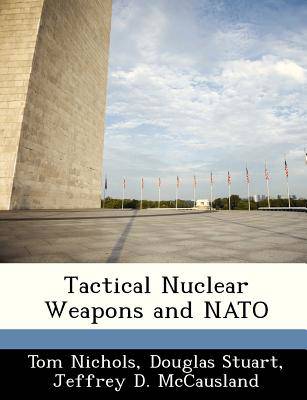
- Afhalen na 1 uur in een winkel met voorraad
- Gratis thuislevering in België vanaf € 30
- Ruim aanbod met 7 miljoen producten
- Afhalen na 1 uur in een winkel met voorraad
- Gratis thuislevering in België vanaf € 30
- Ruim aanbod met 7 miljoen producten
Zoeken
Tactical Nuclear Weapons and NATO
Tom Nichols, Douglas Stuart, Jeffrey D McCausland
Paperback | Engels
€ 40,95
+ 81 punten
Omschrijving
NATO has been a "nuclear" alliance since its inception. Nuclear weapons have served the dual purpose of being part of NATO military planning as well as being central to the Alliance's deterrence strategy. For over 4 decades, NATO allies sought to find conventional and nuclear forces, doctrines, and agreed strategies that linked the defense of Europe to that of the United States. Still, in light of the evolving security situation, the Alliance must now consider the role and future of tactical or non-strategic nuclear weapons (NSNWs). Two clear conclusions emerge from this analysis. First, in the more than 2 decades since the end of the Cold War, the problem itself-that is, the question of what to do with weapons designed in a previous century for the possibility of a World War III against a military alliance that no longer exists-is understudied, both inside and outside of government. Tactical weapons, although less awesome than their strategic siblings, carry significant security and political risks, and they have not received the attention that is commensurate to their importance. Second, it is clear that whatever the future of these arms, the status quo is unacceptable. It is past the time for NATO to make more resolute decisions, find a coherent strategy, and formulate more definite plans about its nuclear status. Consequently, decisions about the role of nuclear weapons within the Alliance and the associated supporting analysis are fundamental to the future identity of NATO. At the Lisbon Summit in Portugal in November 2010, the Alliance agreed to conduct the Deterrence and Defense Posture Review (DDPR). This effort is designed to answer these difficult questions prior to the upcoming NATO Summit in May 2012. The United States and its closest allies must define future threats and, in doing so, clarify NATO's identity, purpose, and corresponding force requirements. So far, NATO remains a "nuclear alliance," but it is increasingly hard to define what that means.
Specificaties
Betrokkenen
- Auteur(s):
- Uitgeverij:
Inhoud
- Aantal bladzijden:
- 544
- Taal:
- Engels
Eigenschappen
- Productcode (EAN):
- 9781288228294
- Verschijningsdatum:
- 29/10/2012
- Uitvoering:
- Paperback
- Formaat:
- Trade paperback (VS)
- Afmetingen:
- 189 mm x 246 mm
- Gewicht:
- 961 g

Alleen bij Standaard Boekhandel
+ 81 punten op je klantenkaart van Standaard Boekhandel
Beoordelingen
We publiceren alleen reviews die voldoen aan de voorwaarden voor reviews. Bekijk onze voorwaarden voor reviews.








